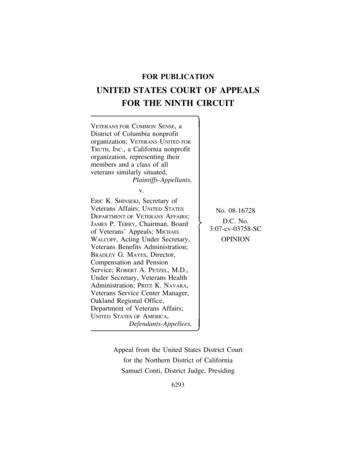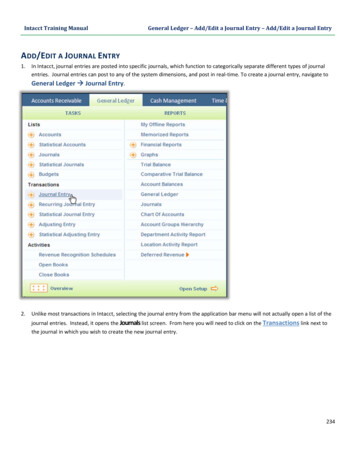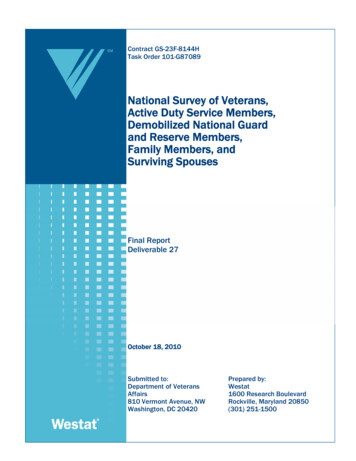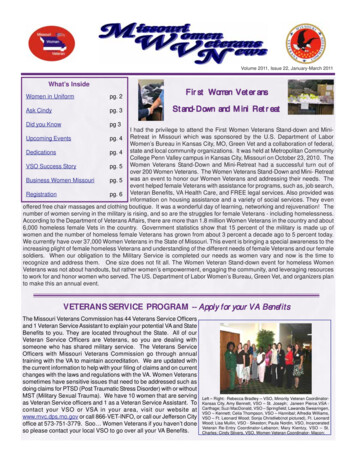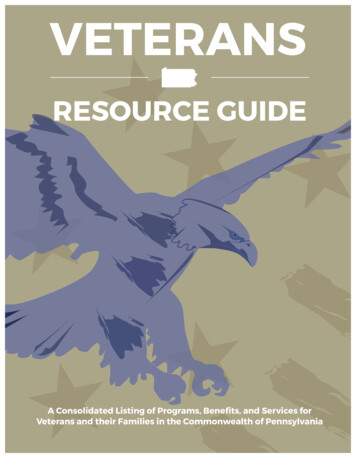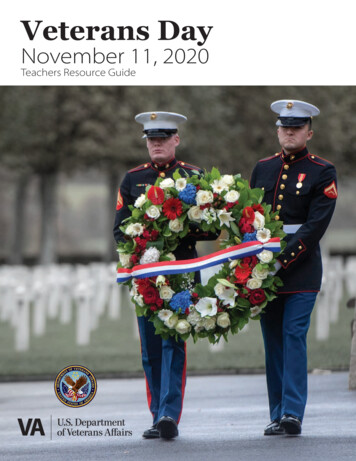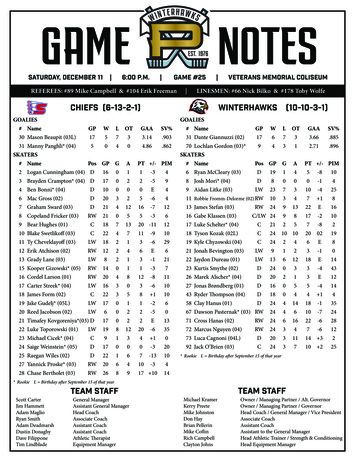
Transcription
VETERANS LAW JOURNALA QUARTERLY PUBLICATION OF THE COURT OF APPEALS FOR VETERANS CLAIMS BAR ASSOCIATIONCAVC Bar Association Spring EventPanel on Character of Discharge andDischarge UpgradesOn Wednesday, May 10, 2017, the CAVC BarAssociation held a panel discussion on the topic ofcharacter of discharge regulations featuring speakersfrom the Veterans Benefits Administration (VBA)and legal scholars from the Mississippi CollegeSchool of Law and the Legal Services Center ofHarvard Law School. Jane Nichols, a member of theCAVC Bar Association Board of Governors,moderated the panel. This event took place at theFederal Circuit Bar Association in Washington, D.C.Much of the discussion focused on the implicationsof VA’s regulations concerning character ofdischarge. VBA’s Roselyn Tyson and Andrew Bodykprovided a foundation for VA benefits eligibility andthe current VA character of discharge process,including statutory and regulatory bars, along withhighlighting new potential development in VArulemaking.Coming from an advocacy and academicperspective, Evan Seamone and Dana Montaltocontributed their thoughts on the impact of currentVA regulation concerning character of dischargeregulations for the veteran population and providedideas on reform.Panelist Dana Montalto was a contributing author ofUnderserved: How the VA Wrongfully ExcludesVeterans with Bad Paper. This piece was publishedby Swords to Plowshares, in conjunction withNational Veterans Legal Services Program and theVeterans Legal Clinic at the Legal Services Center ofHarvard Law School.In summary, Underserved relays the followingmessage:“Not all who have served are “veterans” in the eyesof the Department of Veterans Affairs. If the veteranhas less than a General discharge, the VA createsobstacles to getting health care, benefits, homelessresources and other services. Most of these veteransare simply turned away. Congress never meant foreligibility to be so exclusive, it intended that onlyveterans who served dishonorably be denied access.The VA’s own discretionary policies unnecessarilydeny hundreds of thousands veterans benefits, whoare often those most in need of the VA’s support.These former service members are more likely tohave mental health disabilities and twice as likely tocommit suicide. They are more likely to be homelessand to be involved with the criminal justice system.”Key findings from the report included: Marines are nearly ten times more likely to beexcluded from VA services than theircounterparts in the Air Force Current era service members are excluded athigher rates than other eras– more than twice therate for Vietnam Era veterans and nearly fourtimes the rate for World War II Era veterans Mental health and combat have little effect oneligibility 3 out of 4 veterans with bad-paper dischargeswho served in combat and who have PostTraumatic Stress Disorder are denied eligibilityby the Board of Veterans’ AppealsCAVC Bar Association Spring Panel Event,continued on page 5.
VETERANS LAW JOURNALA Message from the Chief Judgeby Robert N. DavisSUMMER 2017you. We still have one judicial vacancy and areoptimistic that a nominee will be named before theend of the year.Last time I wrote I advised that the Court hadcreated the Judicial Advisory Committee,representing a cross section of the Court'sconstituency. The JAC’s mission is to exchange ideason matters related to the Court's operations and thelarger practice of veterans law, and to shareproposals and recommendations with the Court inan effort to institute positive practice or change. Inearly July the Judicial Advisory Committee puttogether an outstanding informational program onclass action/aggregate litigation. A panel of expertpresenters from across the country shared theirexperiences with invitees to include the Court'sjudges and legal staff, members of the JAC, andmembers of the Court's Rules Advisory Committee.It was an exceptional learning opportunity on acomplex topic. I was pleased that Bar AssociationPresident Megan Kral attended in her capacity as amember of the Judicial Advisory Committee, and Iencourage you to see her as a conduit to thatCommittee.Dear Fellow Bar Association Members,It's hard to believe that fall is upon us. I hope each ofyou found time this summer for some rest andrejuvenation -- I strongly believe that people aremost efficient and productive when they have ahealthy work-life balance. I enjoyed an amazingweek in July canoeing and camping with SpecialForces friends on the Smith River in Montana. It wasboth relaxing and invigorating, and that's a goodthing because it is now back to work and life at theCourt is busy.We were excited to recently welcome Judge MichaelAllen, Judge Amanda Meredith, and Judge JosephToth to the Court. Operating at 55% of our statutoryjudicial strength for the past several months hasbeen challenging. These new judges bring a wealthof varied experience to the Court, and they are eagerand excited to get to work. I know they are lookingforward to the opportunity to interact with theCourt's Bar Association and exchange ideas with2In other news, the Court has renewed its efforts tosecure a suitable permanent Veterans Courthouse.For over ten years, veterans, Veterans ServiceOfficers, and others in the veterans community havesought a courthouse that would be a symbol of thegratitude and respect of the Nation for the sacrificesof those who have served. We recently identified apreferred location and have taken steps to makeappropriate requests to Congress and the GeneralServices Administration. I am excited about thispossibility and ask for the continued support of theBar Association in this endeavor. At the appropriatetime, I anticipate that I may ask that your voices beheard in support of this goal. What a thrill it wouldbe for us all to see a veterans courthouse come tofruition!Enjoy the last vestiges of summer and I look forwardto seeing you soon.Regards,Chief Judge Davis
SUMMER 2017Message from the PresidentVETERANS LAW JOURNALWe are seeking nominees for the ryMembers-at-Large (5 openings)If you have any questions about the responsibilitiesof these positions, please do not hesitate to emailme at cavcbarassoc@cavcbar.net.In my opinion, the benefits of serving on the Boardare vast. Serving on the Board provides a uniquemeeting of the minds, with Board membersrepresenting VA, the Court, private practice,academia, and veterans service organizations, toengage in candid conversation about areas ofsuccess, or concern, in the practice and tobrainstorm on how best to address those areas ofconcern.Happy Summer Everyone!On behalf of the CAVC Bar Association, I would liketo welcome Judge Michael P. Allen, Judge AmandaL. Meredith, and Judge Joseph P. Toth to the UnitedStates Court of Appeals for Veterans Claims. The BarAssociation is excited and encouraged by yourappointments to the bench.Additionally, on behalf of the Bar Association, Iwould like to welcome James M. Byrne as the newGeneral Counsel at the Department of VeteransAffairs and look forward to working with him.It feels like just yesterday I was introducing myselfto the members of this Bar Association, and now Iam planning for my succession. In early August, theBar Association solicited nominees for the nextBoard of Governors. I encourage everyone toconsider seeking election to the Board of Governors.Additionally, and speaking from my own experience,my entire career in veterans law has been limited toappeals. However, serving on the Board ofGovernors showed me that the practice of veteranslaw is much more far-reaching than just the niche Iwas working in. It allowed me to see the biggerpicture more clearly, and, in particular, how themoving parts of the system all worked together.Message from President, continued on page 4.IN THIS ISSUEBankhead v. Shulkin . 8Cantrell v. Shulkin . 10Molitor v. Shulkin . 13Monk v. Shulkin . 15and much more .3
VETERANS LAW JOURNALSUMMER 2017Message from President, continued from page 3.This has made me understand all that much betterhow my small role in the process affects so many ofour nation’s veterans. This knowledge has beeninvaluable.CAVC Bar AssociationUpcoming EventsSeptember 9In the final months of my tenure as President, Iinvite everyone to participate in our upcomingevents. On September 9, members from the BarAssociation will participate with the Honor FlightProgram and welcome veterans to Washington, D.C.On September 17, volunteers will work with theNational Park Service to clean the Vietnam WarMemorial.In addition, on October 20, the Bar Association willsponsor an all-day CLE conference and host ourAnnual Meeting and Reception at the Navy Yard.The current members of the Board of Governors areworking to provide a series of seminars that aretimely to address the current concerns of ourpractice. Once our schedule for the CLE conferenceis solidified, information on how to register will besent via email to all members. Until then, if you haveany questions, or would like to participate in any ofthe above events, please feel free to email me.I look forward to our upcoming events and hope youall will join the Board of Governors and me inattendance.4Honor FlightSeptember 17 Vietnam Memorial Wall WashingOctober 12-14 CAVC Bar Association Table atNOVA Conference, St. Petersburg, FLOctober 20CLE/Annual MeetingDecember 16 National Wreaths Across AmericaDay
SUMMER 2017CAVC Bar Association Spring Event Panel,continued from page 1.“We ask the VA to revise its regulations to moreaccurately reflect congressional intent that onlythose who served “dishonorably” be excluded. Itshould require consideration of positive andmitigating factors and not disqualify veterans forminor misconduct. We also believe the VA can andshould grant access to basic healthcare while itmakes eligibility determinations so that veterans canreceive prompt treatment for service-relatedinjuries. Access to this healthcare can mean thedifference between maintaining stability andentering a spiral of homelessness, addiction, andsuicide.”A full copy of Underserved can be obtained t/uploads/Underserved.pdfVETERANS LAW JOURNALclaims. He was promoted to this area of CentralOffice in June 2006, from the VA Regional Office inNashville, TN.Mr. Bodyk began his VA career as a Veterans ServeRepresentative at the Regional Office in New YorkCity in August 2001. Mr. Bodyk continued his careeras a Veterans Service Representative when he movedto the Nashville Regional Office in Tennessee in May2003. In addition to his time with the Departmentof Veterans Affairs, he has also worked for theDepartment of State (civilian), Department of theArmy (civilian), Department of the Air Force(civilian).Mr. Bodyk is married to LTC Nancy E. Bodyk (ret).She retired from the United States Army in July 2012with 22 years of active duty service.Evan R. Seamone, Law ProfessorThe panelists’ bios are below.Roselyn Tyson, Veterans BenefitsAdministrationMs. Roselyn Tyson is a policy analyst in the VeteransBenefits Administration, Compensation Service (alsoan attorney). As a policy analyst, Ms. Tyson draftsregulations and provides technical guidance onmatters related to VA’s adjudication process, andserves as the subject matter expert on VA’s characterof discharge process. Ms. Tyson joined VA in 2013 asan associate counsel for the Board of Veterans’Appeals.Mr. Andrew P. Bodyk, Veterans BenefitsAdministrationAndrew P. Bodyk currently serves as an ExternalLiaison at the Compensation Service’s InteragencyData Sharing Office in the Veterans BenefitsAdministration Central Office in Washington DC.His area of expertise is in improving the processes inwhich the Department of Defense (DoD) and theDepartment of Veterans Affairs exchange DoDOfficial Military Personnel Files (OMPFs) andService Treatment Records (STRs) as well as otherrecords VA needs from DoD to adjudicate VeteransEvan R. Seamone is a Professor at MississippiCollege School of Law who directs the Legal WritingProgram. He also serves as a Major in the ArmyReserve Component with duties as a Senior DefenseCounsel. Recently, he ended a twelve-year career asan active duty judge advocate. His most recentassignment was service as a Prosecutor in the Officeof Chief Prosecutor of Military Commissions wherehe was responsible for cases involving terrorism andthe acts of unprivileged enemy belligerents tried atGuantanamo Bay, Cuba, under the MilitaryCommissions Act of 2009. In other militaryassignments, Professor Seamone supervisedprosecuting attorneys and several civilian andmilitary paralegals in some of the busiest criminaljurisdictions in the Army. During his tours in Iraq,Germany, and at domestic military installations, hehas participated in sexual assault, complex deathpenalty, and other felony criminal cases involvingPTSD as a prosecutor and defense attorney.Professor Seamone has published over twentyscholarly articles with law schools including Yale,Columbia, Georgetown, and New York University onCAVC Bar Association Spring Event Panel,continued on page 6.5
VETERANS LAW JOURNALCAVC Bar Association Spring Event Panel,continued from page 5.topics including psychology, medical malpractice,national security and international law, and courtadministration. His Military Law Review articles onenhanced legal counseling techniques for clientswith suspected or diagnosed PTSD have beenfeatured by state bar associations, the ArizonaPublic Defenders Association, and in training formilitary disability evaluation attorneys. Along with anumber of preeminent attorneys and mental healthprofessionals, Professor Seamone contributed abook chapter to the volume The Attorneys’ Guide toDefending Veterans in Criminal Court, titled “TheCounterinsurgency in Legal Counseling: PreparingAttorneys to Defend Combat Veterans AgainstThemselves in Criminal Cases.” He has writtenextensively about treatment-based sentencingalternatives in military courts-martial and the use ofcivilian Veterans Treatment and Mental HealthProblem-Solving Courts by military organizationsand commanders.Professor Seamone presented at the Court ofAppeals for Veterans Claims Judicial Conferenceregarding an article he co-authored onunderstanding the Department of Veterans Affairs’Character of Discharge review process for veteransseparated with stigmatizing discharges. He has alsotrained attorneys at the Board of Veterans Appealsand Veterans Service Officers on this topic. Afterpublishing the first ever article to assist custodyevaluators and family court judges in improvingtheir assessment of parents with PTSD, ProfessorSeamone accepted an offer to edit a special editionof The Family Court Review devoted to militaryfamilies and the courts. Professor Seamone workedhand-in-hand with various interdisciplinary authors(including psychiatrists, pediatricians, judges, andattorneys) to address a wide range of family lawissues currently facing veterans and their families.On May 30, 2013, Professor Seamone received theMeyer Elkin Essay Award from the Association ofFamily and Conciliation Courts for his Family CourtReview article from a panel of distinguished6SUMMER 2017interdisciplinary professionals. As the Vice Chair ofthe Military Committee of the National Council ofJuvenile and Family Court Judges, he is involved inthe development of a standardized curriculum toassist family court judges in better understandingthe unique needs of military families.Dana Montalto, Legal Services Center ofHarvard Law SchoolDana joined the Legal Services Center as anAttorney and Arthur Liman Public Interest Fellow inthe Veterans Law Clinic in 2014. She represents lowincome veterans who received less-than-honorabledischarge in discharge upgrades and federal andstate veteran benefits.Dana received her bachelor’s degree, magna cumlaude and Phi Beta Kappa, from Wellesley Collegeand her law degree from Yale Law School, where sheparticipated in the Veterans Legal Services Clinicand the International Refugee Assistance Project.After graduating, Dana clerked for the Honorable F.Dennis Saylor IV of the U.S. District Court for theDistrict of Massachusetts.Appeals ReformLegislation Passedby Jenny J. TangOn August 1, 2017, the Senate unanimously voted topass the “Veterans Appeals Improvement andModernization Act of 2017” (S. 1024) to reform thecurrent VA appeals process. The House version ofthe bill (H.R. 2288) was unanimously passed in May.The Veterans Appeals Improvement andModernization Act of 2017 proposes a new appealsframework in which a Veteran or claimant maychoose one of three processing lanes within one yearafter receipt of an initial decision by the agency oforiginal jurisdiction (AOJ).Appeals Reform Legislation Passed, continuedon page 7.
SUMMER 2017Appeals Reform Legislation Passed, continuedfrom page 6.One, the claimant can file a request for higher-levelde novo review at the AOJ level. This higher-leveladjudication is limited to the evidence already ofrecord, and there is no opportunity for a hearing.The higher-level adjudicator may return the claim tothe lower-level to correct pre-decision duty to assisterrors.Two, the claimant can file a “supplemental claim.”In this lane, the claimant can submit new evidenceand have a hearing, and VA would have a duty toassist.Three, the claimant can file a notice ofdisagreement, which would appeal to the Board ofVeterans’ Appeals (BVA). This lane is split into twoseparate dockets: one for a non-hearing option withno submission of new evidence, and one for ahearing option that also provides a limited windowto submit new evidence. BVA may remand tocorrect pre-decision duty-to-assist errors. After theBVA decision, the claimant may submit asupplemental claim within one year, or the claimantmay appeal to the Court of Appeals for VeteransClaims within 120 days.Once the higher-level review, supplemental claim,or notice of disagreement is adjudicated, a claimantmay then choose to pursue another lane insuccession with respect to the same claim or issue.The effective date of a grant of benefits would be atearliest the date of receipt of an application forbenefits. This date would be considered the date ofthe initial application for benefits throughout theappeal process if the claim was continuouslypursued, even if successively through more than oneof these lanes.If more than one year has passed since the AOJdecision, the claimant may file a supplementalclaim, and the claim will be “readjudicated” if newVETERANS LAW JOURNALand “relevant” evidence is submitted. For suchsupplemental claims received more than one yearafter the AOJ decision, the effective date would be atearliest the date of the receipt of the supplementalclaim.President Trump signed the bill on August 23, 2017.The Veterans Appeals Improvement andModernization Act of 2017 can be found here.Jenny J. Tang is Associate Counsel at the Departmentof Veterans Affairs, Board of Veterans' Appeals. Shealso serves as Secretary for the CAVC BarAssociation.President Trump NominatesCandidates for CAVC JudgeshipsBy Jeremy R. BedfordOn June 7, 2017, President Trump nominatedMichael P. Allen, Amanda L. Meredith, and JosephL. Toth to fill three of four judicial vacancies at theCourt.Michael P. Allen is a familiar face in the field ofveterans’ law. Professor Allen’s first experience inveterans’ law was when he was asked to speak at theCourt’s Judicial Conference in 2006. According tohis July 19, 2017, Senate testimony, he was asked tospeak before the Conference precisely because heknew nothing of veterans’ law. Since speaking atthat conference, he has spoken to groups across thecountry about veterans’ law, presented at judicialconferences for the Court, and Federal Circuit,become the Director of the Veterans Law Institute atStetson University, written law review articles aboutveterans law, and testified before the Senate andHouse Veterans Affairs Committees. He isconsidered an expert in the field of veterans’ law.President Trump Nominates Candidates forCAVC Judgeships, continued on page 8.7
VETERANS LAW JOURNALPresident Trump Nominates Candidates forCAVC Judgeships, continued from page 7.Amanda L. Meredith is also a familiar face in thefield of veterans’ law. Confirmation as a Judge is ahomecoming of sorts for Ms. Meredith. She beganher legal career by serving as a law clerk for theCourt for seven years.Subsequently, she has served for more than 12 yearsin the United States Senate Committee on Veterans’Affairs where she conducted oversight and analyzedlegislation regarding veterans’ benefits, the claimsand appeals process at VA, and the Court. She iscurrently serving as the General Counsel and DeputyStaff Director for the Senate Veterans AffairsCommittee.Joseph L. Toth is a veteran of the Naval JudgeAdvocate General Corps. He served in the war inAfghanistan as a field officer in the Rule of LawField, where he was stationed with the 10th MountainDivision in the Zhari District. SInce leaving theactive duty military, Mr. Toth has spent his career asa lawyer in federal trial and appellate courts. Hecurrently serves as a federal public defender inWisconsin.These three candidates appeared in a hearing beforethe Senate Veterans Affairs Committee on July 19,2017. On the following day, the Committee voted infavor of sending their nominations to the full Senatefor consideration. The three candidates wereconfirmed by the full Senate as judges on August 3,2017.While these nominations are certainly a step in theright direction, the Court still has one vacancy forwhich a nomination has not been made.Jeremy R. Bedford is a Staff Attorney with the CourtSUMMER 2017The Board May Not Consider Risk ofSelf-Harm or Hospitalization inGauging the Severity of SuicidalIdeationby Stuart J. AndersonReporting on Bankhead v. Shulkin, no. 15-2404 (Mar.27, 2017).In Bankhead v. Shulkin, the Court considered theterm “suicidal ideation” from 38 C.F.R. § 4.130’scriteria for a 70 percent disability evaluation forservice-connected mental disorders. The Court heldthat the Board may not require more than thoughtsof death to establish the symptom of suicidalideation and may not consider the absence ofhospitalization as a reason to find the symptominsufficiently severe to warrant a 70 percentevaluation.Mr. Bankhead claimed service connection forposttraumatic stress disorder. A VA regional officegranted service connection for major depressivedisorder, with a 30 percent evaluation under 38C.F.R. § 4.130, diagnostic code (DC) 9411, effectivethe date of the claim. The Board, in the decision onappeal, assigned Mr. Bankhead a 50 percentevaluation. Mr. Bankhead appealed.The Board denied a 70 percent evaluation despiteMr. Bankhead’s documented and undisputedexperience of suicidal ideation. As regards thesuicidal ideation, the Board found that the symptomlacked the severity that would justify a higherevaluation because Mr. Bankhead was at asufficiently low risk of self-harm, he had beenconsistently treated on an outpatient basis, andthere were no instances of hospitalization, inpatienttreatment, or domiciliary care for his suicidalideations.Bankhead, continued on page 9.8
SUMMER 2017VETERANS LAW JOURNALBankhead, continued from page 8.The Court issued a single-judge decision on the caseon March 17, 2017. After the Secretary filed a motionfor panel reconsideration or, in the alternative, enbanc review, the Court granted the motion for panelreconsideration and issued the present opinion onMay 19, 2017. The Secretary has filed a secondmotion for en banc review.In an opinion authored by Judge Bartley, the Courtfirst considered whether the Board had erred indenying a 70 percent evaluation for the veteran’sservice-connected major depressive disorder or, inthe alternative, provided an inadequate statement ofreasons or bases by conflating the symptom ofsuicidal ideation with the risk of self-harm. TheCourt noted that the Board had found that Mr.Bankhead’s suicidal ideation did not rise to the levelcontemplated by a 70 percent evaluation because ofthe low risk of self-harm associated.The Court also noted the contention by theSecretary that the degree of social and occupationalimpairment resulting from suicidal ideation shouldbe measured by the degree of risk of self-harm. Butthe Court found that the Board’s measure of severityof “suicidal ideation” in terms of the risk of selfharm conflated that symptom with the 100 percentsymptom “persistent danger of hurting self.”Specifically, the Court dissected the meaning of theterm “suicidal ideation” in 38 C.F.R. 4.130, findingthat it encompassed a spectrum of behavior relatedto thinking about death, including both passive andactive, and with and without intent. The Courtconcluded that the plain language of the regulationindicated that Mr. Bankhead’s thoughts about hisdeath without more can cause occupational andsocial impairment in most areas (the level ofimpairment warranting a 70 percent evaluation).The Court also observed that, while there was noanalogous symptom listed for lower evaluations in38 C.F.R. 4.130, that regulation identified “persistentdanger of hurting self or others” among thesymptoms that may warrant a 100 percentevaluation.The Court ultimately rejected the Secretary’sargument that the risk of self-harm was a propergauge for the severity of suicidal ideation. Itdetermined that this argument improperly narrowedthe scope of the symptom “suicidal ideation” fromthe plain meaning of that term, a meaning that didnot depend at all on the risk of self-harm. It alsonoted that, because risk of self-harm was alreadyexplicitly a criterion for 100 percent evaluation, byconsidering suicidal ideation in light of the risk ofself-harm the Board improperly conflated theassessment of the distinct symptoms of differentseverity in a way that frustrated judicial review.The Court next considered whether the Board erredin using hospitalization as a gauge for the severity ofMr. Bankhead’s suicidal ideation. The Courtobserved that the Board was required to measurethe impact that Mr. Bankhead’s symptoms had onhis social and occupational situation. That measure,however, had to consist of a consideration of theactual impact experienced by Mr. Bankhead, not areference to what the Court called an “externalgauge.” Hospitalization may be relevant as anindicator of the severity of symptoms in a casewhere the veteran is hospitalized, the Courtcontinued, but its absence may not be used todiscount the severity of symptoms.Finally, the Court considered whether the Board hadimproperly combined the levels of impairmentrequired for a 70 percent evaluation and a 100percent evaluation. The Board had found that thesuicidal ideation did not warrant an evaluationhigher than 50 percent because Mr. Bankhead stillretained some social and occupational functioning.Because a 70 percent evaluation requires onlyoccupational and social impairment withdeficiencies in most areas and not total occupationalsocial impairment—the level warranting a 100percent evaluation—the Court found that the Boardhad erred in applying an incorrect standard.Stuart Anderson is an attorney for the Department ofVeterans Affairs, Office of General Counsel, Court ofAppeals for Veterans Claims Litigation Group.9
VETERANS LAW JOURNALThe Court Addresses Employment ina ‘Protected Environment’by Samantha MountfordReporting on Cantrell v. Shulkin, No. 15-3439 (April18, 2017)In Cantrell v. Shulkin, the Court of Appeals forVeterans Claims reviewed the Board of Veterans’Appeals decision to deny entitlement to a totaldisability evaluation based on individualemployability (TDIU) and referral for considerationof an extraschedular evaluation. The Courtaddressed the issue of how to apply the concept ofemployment in a “protected environment” in thecontext of determining entitlement to a TDIU, aswell as the applicability of Johnson v. McDonald,when deciding if an extraschedular referral iswarranted.Mr. Cantrell served in the U.S. Army from January1988 to September 1988 and in the U.S. Air Forcefrom May 2003 to August 2003. The current appealstems from a September 2006 claim for serviceconnection for ulcerative colitis. The regional office(RO) granted service connection in December 2011and assigned staged ratings for the disability thenext month. The Veteran timely appealed thisdecision, seeking an increased initial evaluation forthe disability. Subsequently, the Veteran wasgranted secondary service connection for urgeincontinence, degenerative joint disease of the leftand right hips, hemorrhoids, erectile dysfunction,and pouchitis. Additionally, the Veteran requested,and was denied, entitlement to a TDIU. TheVeteran perfected his appeals of the RO’s denials, ofan increased initial rating for ulcerative colitis andentitlement to a TDIU, to the Board.Throughout the record on appeal, the Veteranrepeatedly identified the symptoms of his serviceconnected disabilities, specifically pouchitis, and theeffects these symptoms had on his employability.Specifically, the Veteran described that he wouldexperience 6 to 10 bowel movements per day and 1610SUMMER 2017to 20 bowel movements per day during monthlyepisodes of pouchitis. The Veteran also reportedthat during pouchitis episodes he had urinary andfecal leakage, causing him to change his underweartwo to three times per day.At the time of the appeal, the Veteran worked as apark ranger and reported that he was only able toperform this job due to the numerousaccommodations made by his employer.A TDIU is warranted when a veteran is unable tosecure or follow a substantially gainful occupation asa result of service connected disabilities. 38 C.F.R. §4.16 (2016); see Hatlestad v. Brown, 5 Vet. App. 524,529 (1993). Relevant to the case at hand, § 4.16additionally states that “[
an associate counsel for the Board of Veterans Appeals. Mr. Andrew P. Bodyk, Veterans Benefits Administration Andrew P. Bodyk currently serves as an External Liaison at the Compensation Services Interagency Data Sharing Office in the Veterans Benefits Administration Central Office in Washington DC.

